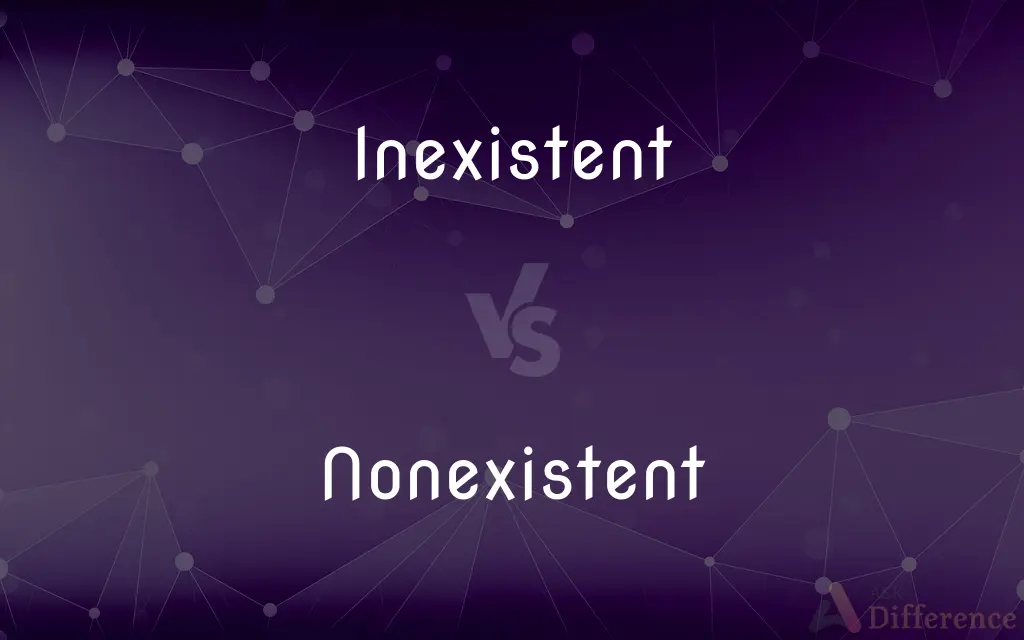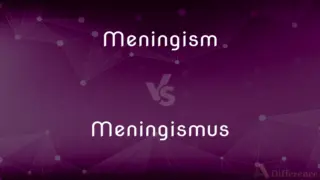Inexistent vs. Nonexistent — What's the Difference?
By Fiza Rafique & Maham Liaqat — Updated on March 10, 2024
Inexistent refers to something not existing in reality or theory, emphasizing absence in broader contexts, while nonexistent focuses on the lack of existence in a specific, often physical or factual sense.

Difference Between Inexistent and Nonexistent
Table of Contents
ADVERTISEMENT
Key Differences
Inexistent often conveys a philosophical or abstract idea of not being present in any form or context. It might be used to describe concepts, entities, or phenomena that are considered entirely outside the realm of reality or possibility. Whereas, nonexistent is commonly used in practical, everyday language to indicate that something does not exist or is not present in a specific situation or place. This term is frequently applied to objects, conditions, or elements that are expected but found to be absent.
In the realm of discussions about existence, inexistent might be utilized to ponder the nature of things that are fundamentally unobservable or unknowable, such as hypothetical dimensions or theoretical constructs that have no empirical evidence. On the other hand, nonexistent is more likely to be used when referring to tangible items or conditions that can be empirically verified but are confirmed to be absent, such as a missing document or a species declared extinct.
Considering the implications of the terms, inexistent can imply a more permanent and definitive absence, suggesting that the entity or concept in question cannot ever exist under any circumstances. In contrast, nonexistent might imply a temporary state, indicating that while something does not currently exist, it could potentially come into existence in the future or under different conditions.
In terms of usage context, inexistent is more likely to be found in formal, philosophical, or theoretical discussions, where the nature of existence itself is being explored. Nonexistent, however, is used across a broad range of contexts, from casual conversation to scientific discourse, often to describe the absence of expected or necessary items, features, or conditions.
Despite their differences, both terms serve as important linguistic tools for distinguishing between the varied nuances of absence and non-existence. Understanding the subtle distinction between them can enhance clarity and precision in both written and spoken language.
ADVERTISEMENT
Comparison Chart
Meaning
Refers broadly to the lack of existence in any form or context.
Indicates absence in a specific, factual, or physical sense.
Usage Context
Often used in philosophical or abstract discussions.
Commonly applied in practical, everyday language.
Connotation
Implies a fundamental or theoretical absence.
Suggests a verifiable or empirical absence.
Implication
Can imply a permanent state of non-being.
Might imply a temporary or conditional absence.
Example Usage
Discussing theoretical concepts with no basis in reality.
Describing tangible items or conditions that are missing.
Compare with Definitions
Inexistent
Completely absent in all possible realities.
The concept of a perpetually motionless object is inexistent in our universe.
Nonexistent
Not existing in the current context or situation.
The file you're looking for is nonexistent in our records.
Inexistent
Beyond the scope of existence.
Alien life forms are still considered inexistent by mainstream science.
Nonexistent
Unobservable or undetectable.
Evidence of water on the planet is currently nonexistent.
Inexistent
Not found within any known parameters.
An inexistent solution to the equation puzzled the mathematicians.
Nonexistent
Lacking existence in the physical world.
The rumored treasure turned out to be nonexistent.
Inexistent
Philosophically or theoretically non-existent.
In his essay, he explores the inexistent boundaries between mind and matter.
Nonexistent
Absent or missing where expected.
Customer service at that store is practically nonexistent.
Inexistent
Not present in any form or context.
The idea of a world without gravity is inexistent.
Nonexistent
Not present or available.
Options for vegan diners were nonexistent at the barbecue.
Inexistent
Having no existence; nonexistent.
Nonexistent
The condition of not existing.
Inexistent
Nonexistent.
Nonexistent
Something that does not exist.
Inexistent
Not having being; not existing.
Nonexistent
Not existent or existing; not real.
"Hrunk" is a nonexistent word.
His social skills are nonexistent: he chewed with his mouth open all through dinner.
Inexistent
Inherent; innate; indwelling.
Nonexistent
Not present or occurring.
Nonexistent
Something that does not exist.
Nonexistent
Not having existence.
Nonexistent
Not having existence or being or actuality;
Chimeras are nonexistent
Nonexistent
Not existing;
Innovation has been sadly lacking
Character development is missing from the book
Common Curiosities
Can something be both inexistent and nonexistent?
Yes, something can be described as both if it lacks existence both in theory and in practical, specific contexts.
Why might one choose to use inexistent over nonexistent?
One might choose "inexistent" to emphasize a more abstract, philosophical absence, whereas "nonexistent" often refers to a tangible or specific absence.
What does inexistent mean?
Inexistent refers to something that does not exist in any form, often used in abstract or theoretical contexts.
Is inexistent a real word?
Yes, inexistent is a real word, though it's less commonly used than nonexistent.
What is the opposite of nonexistent?
The opposite is existent, implying presence or existence in a specific situation or context.
How do languages other than English handle these concepts?
Different languages have their own terms and nuances for absence or non-existence, reflecting cultural and philosophical variations.
What does nonexistent mean?
Nonexistent describes something that does not exist or is not present in a specific situation or context.
Is inexistent used in scientific discussions?
It can be, especially in theoretical physics or metaphysics, but "nonexistent" is more common in empirical science.
How do existential philosophers view the terms inexistent and nonexistent?
Existential philosophers may explore these terms deeply, examining the nature of existence and the implications of absence.
Can the status of being nonexistent change?
Yes, something that is nonexistent can potentially become existent if conditions change or if it is discovered or created.
How do inexistent and nonexistent relate to the concept of void?
Both can describe the absence of matter or elements in a void, but inexistent might suggest a more conceptual or total emptiness.
What is the opposite of inexistent?
The opposite is existent, meaning something that does exist in some form or context.
Does technology or artificial intelligence challenge the meanings of inexistent and nonexistent?
Yes, as technology and AI evolve, they challenge and expand our understanding of what can be considered existent or nonexistent, especially in virtual or simulated environments.
Can ideas or concepts be inexistent?
Yes, ideas or concepts that are fundamentally unfeasible or unimaginable can be described as inexistent.
Can inexistent apply to emotions or feelings?
Yes, in a metaphorical sense, one might describe certain emotions or feelings as inexistent to emphasize their complete absence.
Share Your Discovery

Previous Comparison
Meningism vs. Meningismus
Next Comparison
Salami vs. PepperoniAuthor Spotlight
Written by
Fiza RafiqueFiza Rafique is a skilled content writer at AskDifference.com, where she meticulously refines and enhances written pieces. Drawing from her vast editorial expertise, Fiza ensures clarity, accuracy, and precision in every article. Passionate about language, she continually seeks to elevate the quality of content for readers worldwide.
Co-written by
Maham Liaqat













































